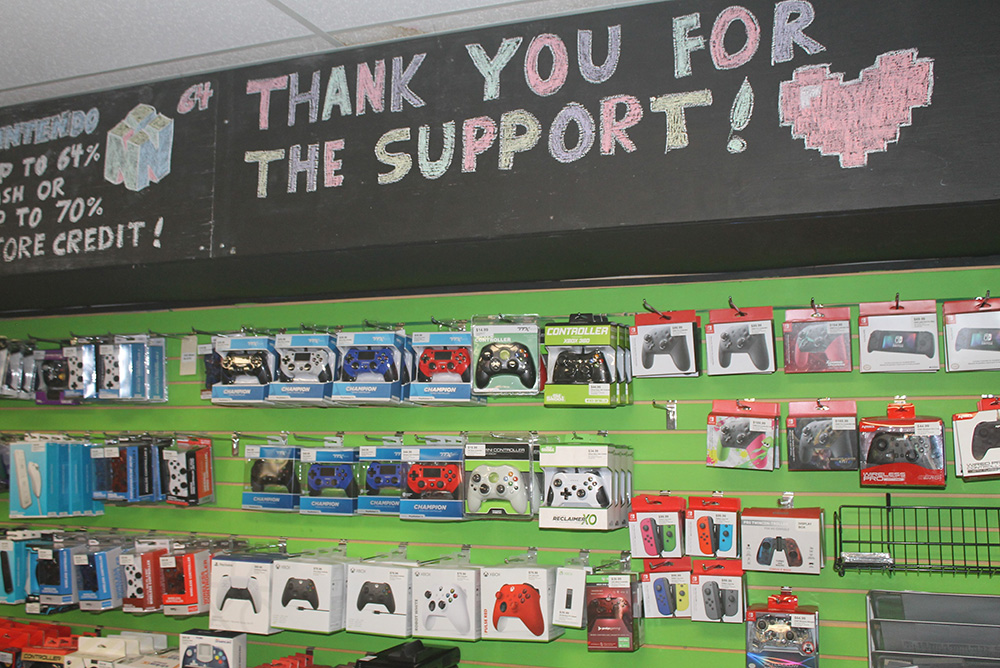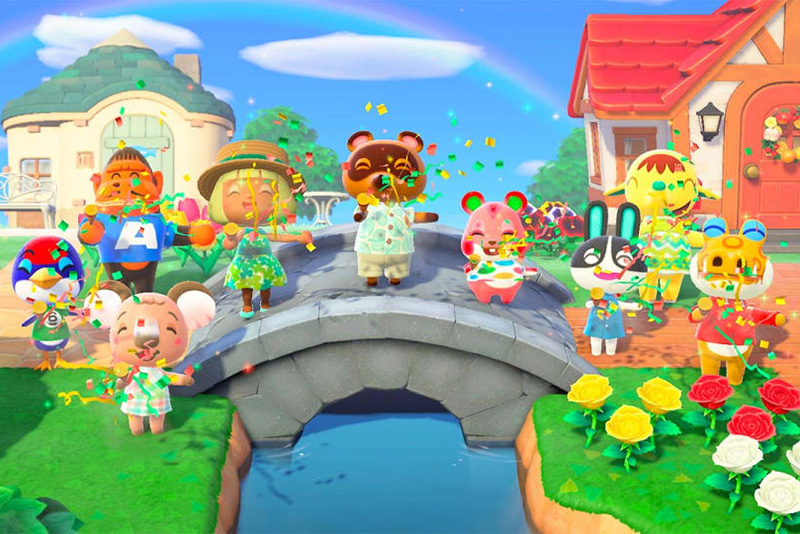The theatres sat empty. The stadiums went silent. The bars locked down. But while COVID-19 raged, inside our homes saw the glow of screens, with people turning to Netflix and other streaming platforms.
And to video games. Once criticized for everything from glorifying violence to promoting addiction, games found a new, positive role during the pandemic, researchers say.
Video gaming turned out to be one of a handful of pandemic-proof industries, and it is now bigger than the movie industry.
During COVID-19’s peak, it seemed impossible to get your hands on some games or consoles. Nintendo Switch sales exploded, with the corporation’s net profits jumping 86 per cent for the fiscal year that ended March 31. The popular consoles were as hard to get as toilet paper in the pandemic’s early days.
Even retailers benefited. One Victoria, B.C.-based game store saw a huge increase in traffic, which helped solidify its plans to expand into nearby Langford.
“It was definitely far busier than it had ever been before,” says Jacob Lake, who has worked as a manager with Epic Games & More for five years. “I definitely think a lot of people were bored and restless and probably were trying to scrounge for things to keep them occupied.”
The boom was also evident in B.C.’s game design industry, which according to a 2019 study, directly employed 7,300 people full time, up from 5,900 in 2017. Canada is now the third-largest producer of video games in the world, after the U.S. and Japan, according to the Entertainment Software Association of Canada.
In B.C., the economic impacts have made headlines. Indie developer Klei Entertainment, the Vancouver-based studio behind the smash hit Don’t Starve, was acquired by a Chinese tech giant in January. In Victoria, indie studio Metalhead Software, developer of the popular Super Mega Baseball, was bought out by American gaming giant Electronic Arts in May.
But while developers and stores reaped the business benefits, there was also a social and psychological impact.
David Leach is the director of the University of Victoria’s digital storytelling and social simulation lab, which offers courses for students interested in making video games or using other interactive media. He says lockdowns and restrictions led to surprising shifts in the classroom and students’ work.
“I had one student create a very powerful little interactive game, essentially about being locked in your house in a pandemic, and just the weird things that does to your state of mind,” says Leach.
Those weird things have been researched by scientists like Olav Krigolson, a UVic neuroscientist who spent time at a U.S. facility studying the effects of isolation, a reality for many people since COVID-19 changed life.
Krigolson was locked into the NASA HI-SEAS Mars Habitat for a week. The facility, located on Mauna Loa in Hawaii, serves as a training simulator for long-term space missions, with astronauts and scientists spending months at a time in isolation. Krigolson and his team logged their brain patterns over a week and found evidence of stress and cognitive dysfunction.
“We were able to detect that we were exhausted by the end of the day, mentally,” he says.
The research team found themselves quickly latching on to even small emotional outlets, like recorded video messages sent by family members.
Krigolson says the experience was more severe than most COVID-19 lockdowns, but it did clarify the need for human interaction. Digital technologies similar to those used in games are being looked into for situations like a possible NASA Mars mission, where isolation could be extreme, he adds.
“They’re experimenting a lot with virtual reality… to be able to give someone the chance to walk in a park” while on the mission, he says.

This ability to replicate real-life experiences, according to Leach, is how video games came into such prominence during the pandemic. He gives the example of Animal Crossing: New Horizons, which offers players a private island to help shape and develop. Players can build structures, craft items and more. And they can interact with other players sharing the island.
The game was a tremendous success, and Lake says the Epic Games & More staff couldn’t get enough copies to meet their pre-orders on time. Indeed, Nintendo’s fiscal year-end report credited New Horizons as their bestselling title of 2021, with 21 million units sold.
Leach says the title came at exactly the right time.
“A game like Animal Crossing is much more inclusive,” he says. “It’s more of a meditative kind of social experience that appeals to a different type of person. The fact that there are forms of interactive media that can suit all sorts of personalities just shows the growth and evolution of the industry.”
Research on the topic is evolving as well. A study from Oxford University found that video games proved to be a positive influence on people’s psychological well-being during the pandemic.
This study was one of the first times that data from gaming companies like Nintendo was used to learn about people’s game play. Up until now, psychological research on video games has largely relied on people self-reporting their gaming habits.
“Without objective data from games companies, those proposing advice to parents or policymakers have done so without the benefit of a robust evidence base,” said professor Andrew Przybylski, director of research at the Oxford Internet Institute and lead author of the study.
The Oxford researchers surveyed 3,274 American, British and Canadian players of Animal Crossing: New Horizons and Electronic Arts’ Plants Vs. Zombies, which pits a homeowner, armed with plants, against zombies. Players were asked about their well-being, motivations for playing and gaming habits. Survey questions included self-reporting on positive or negative feelings, as well as interpersonal interactions like, “I found the relationships I formed fulfilling.”
The responses were then matched up to their gaming data, which was released with player consent to the researchers by Electronic Arts and Nintendo.
“For the first time we’ve been able to investigate the relation between actual game play behaviour and subjective well-being, enabling us to deliver a template for crafting high-quality evidence to support health policymakers,” said Przybylski.
Lin Zhu, a graduate student at the University of Albany who researches video games and psychology, says this is an important step.
In a case study, Zhu argues that more research on this phenomenon is needed now that people are embracing games as an emotional and psychological outlet. In the graduate student’s opinion, too much of our discourse has focused on video game addiction and violence.
“Video games have always appeared to the public with a relatively negative image,” she writes. “However, in this crisis, their players in some ways are benefited. New Horizons has opened the door to a parallel world.
“On the one hand, New Horizons provides a dreamland for the players to temporally escape from the cruel reality with a risk of losing in escapism. On the other hand, the New Horizons world becomes a perfect social platform to keep social interaction with others to get rid of the loneliness.”
Zhu says that video games should be looked at for potential therapeutic applications, as health care tools, or as part of training for specialized professions in STEM fields.
Researchers are still cautious. The Oxford study found that players who reported better well-being in their real lives were also more likely to feel positive about video games, suggesting a real-world foundation is still vital.
Krigolson also says that while NASA may be investing in virtual reality, it’s not going to be a substitute for real life.
“While Zoom and these things are good, they can’t replace face-to-face interaction,” he says. “Is it better than nothing? Yes.”
For Zhu, that’s enough. Video games aren’t the total answer to mental health, but during a time of crisis, they were a boon, and not the negative toxic force they’ve been portrayed as in the past.
“It’s a pretty good way to have social interaction with others, and make new friends as well,” she says. “I just want to prove that we can use video games in a good way.”
With the industry pandemic-proofed, there should be plenty of data on the horizon. ![]()
Read more: Health, Coronavirus
















Tyee Commenting Guidelines
Comments that violate guidelines risk being deleted, and violations may result in a temporary or permanent user ban. Maintain the spirit of good conversation to stay in the discussion.
*Please note The Tyee is not a forum for spreading misinformation about COVID-19, denying its existence or minimizing its risk to public health.
Do:
Do not: